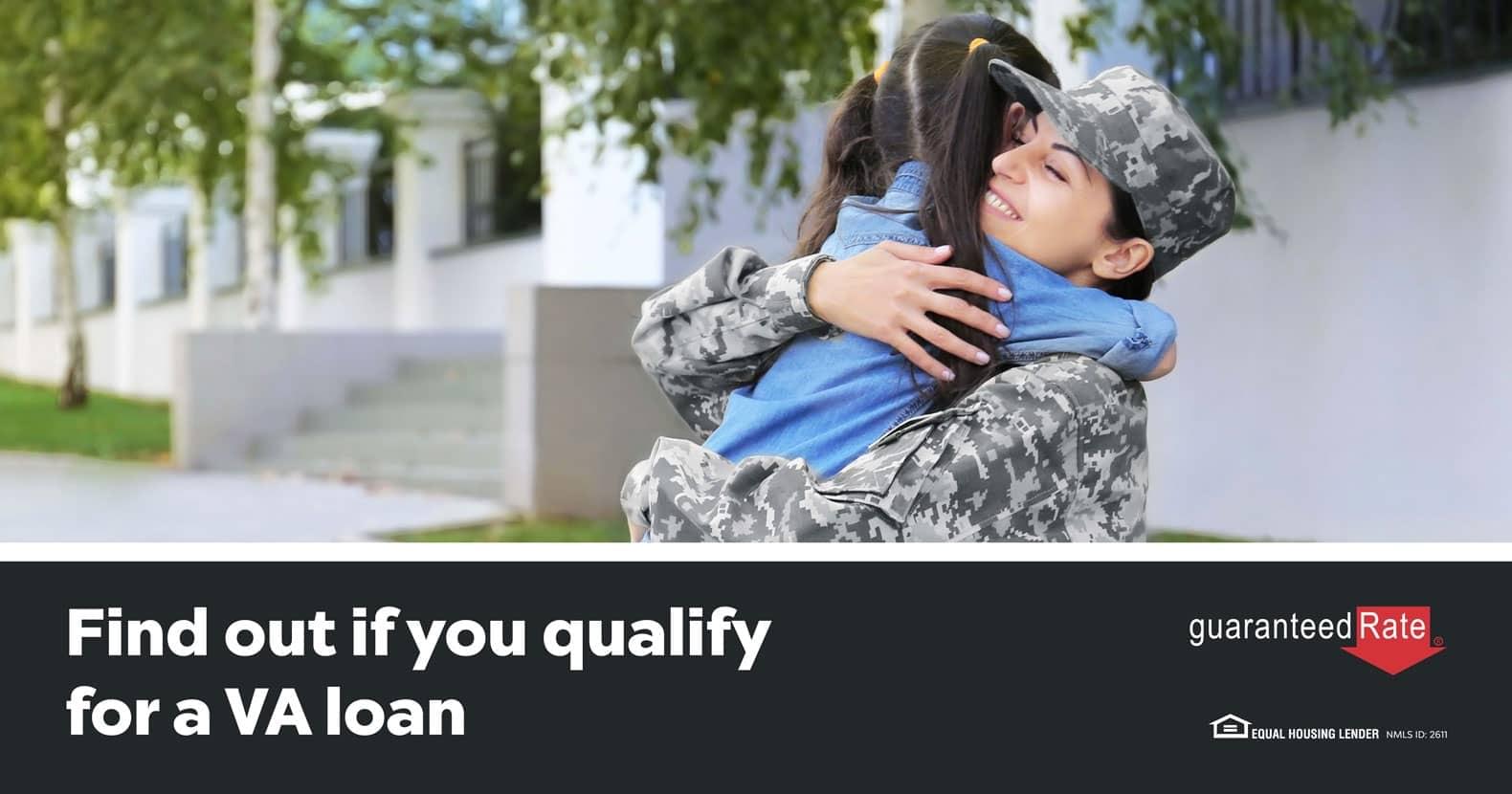How to Qualify for a VA Loan: Requirements and Eligibility

If you’re like most people, you want to own your own home, and the VA home loan program can help veterans make that dream come true in ways that other loan programs can't.
A VA loan can help you buy a home with no down payment. The interest rates are better and there are fewer rules. But before you start, you should know exactly what you need to do and how you can qualify. That way, you'll be ready to succeed from the start.
This guide walks you through everything you need to know about VA loan eligibility and requirements for 2024, helping you prepare to apply with confidence. And with Rate’s Same Day Mortgage, you could be on the fast track to owning a home—today.
VA Loan Eligibility Requirements
To help veterans and military members, VA loans are set up differently than conventional loans, and their requirements reflect this difference.
Here’s a clear VA mortgage guide on what you need to know about qualifying income, down payments, property standards, and seller requirements.
VA Home Loan Income Requirements
Having a steady income and a reasonable amount of debt makes your home buying potential stronger, but it’s not a necessity. During the loan process, VA lenders still want to make sure you can afford the monthly payments so they’ll assess your debt-to-income (DTI) ratio instead.
Your DTI shows how much of your monthly income goes toward paying off your debts. Preferably, it should be 41% or less. However, mortgage companies may approve applications with a higher DTI if other factors can show financial stability.
For example, if your residual income, what’s left after covering major expenses like housing, utilities, and taxes, is higher than the minimum requirement, it can offset a higher DTI.
Future earning potential is another important consideration. If you’re transitioning from active duty to a high-paying civilian job, lenders may take that into account for your expected income rather than just focusing on your current DTI.
Also, if you have a larger amount of savings, lenders may view this as a safety net, making them more likely to approve your application even with a slightly higher DTI.
VA Loan Down Payment Requirements
VA loans are different from other loan options because they let qualified veterans, service members like national guard members, and the surviving spouse of a veteran buy a house with zero down payment. This one-of-a-kind home loan benefit allows qualified buyers to finance 100% of the home’s purchase price and use their savings on other financial priorities.
There are, however, a few exceptions to this rule. For example, in high-cost housing areas where home prices often exceed the VA's loan limits, you may be required to make a down payment to cover the difference if you don’t have full entitlement.
Another scenario involves purchasing a second home due to military relocation. If you already have a VA loan on an existing property, your remaining entitlement might not fully cover the cost of your new home.
Non-veteran co-borrowers can also influence if you need a down payment or not. If you’re buying real estate with a co-borrower who is not your spouse or another veteran, lenders may require a down payment—typically to offset the increased risk.
VA’s Minimum Property Requirements
Because VA loans are only for main residences, the U.S. Department of Veterans Affairs has strict rules about the type of property that can be used as a home purchase.
Single-family houses, condos that are approved by the VA, and some townhouses are generally eligible. Vacation homes and investment properties are not.
The property must also meet the minimum property standards (MPRs) which make sure that homes purchased with VA loans are safe and ready to move into. The MPRs include structural soundness, basic safety features, and services that are up and running.
If a house meets MPRs, you’ll more than likely face fewer problems after you move in, which makes the home a safe investment.
How Do I Request a Certificate of Eligibility (COE)?
A Certificate of Eligibility (COE) is important if you want to qualify for a VA loan and shows you if you meet the minimum service requirements. You can request it in these 3 ways:
- Online: Use your VA.gov account to access the eBenefits portal for a quick submission.
- Through Private Lenders: Many private lenders handle COE requests during your loan application.
- By Mail: Submit VA Form 26-1880 and supporting documents, like a DD-214 for veterans or NGB Form 22 for National Guard members, to a regional loan center.
The COE is a necessary document for VA loan programs like a purchase loan, cash-out refinance, or IRRRL (Interest Rate Reduction Refinance Loan).
Your eligibility ultimately depends on your service, including active duty, Selected Reserve, or time as missing in action or a prisoner of war.
Programs like the Native American Direct Loan also require you to get a COE.
Overall, it’s important for you to get your COE to access VA benefits like competitive interest rates, no VA-mandated minimum credit score, and reduced lending fees.
VA Loan Requirements for Sellers
A VA appraisal is required when purchasing a house using a VA loan. During this step, an appraiser figures out how much the property is worth on the market and makes sure it meets basic safety and livability standards.
This estimate isn't as thorough as a home inspection, but it does make sure that the home is priced fairly and is in good shape for you as the buyer. If the appraiser finds problems, the buyers may have to fix them so that the home meets VA eligibility requirement standards.
There are also limits on some fees that sellers can charge VA buyers, like fees for pest inspections in some states. This protects your costs as a buyer even more, making VA loans even better for you.
VA Loan Qualifications
To get a VA loan, meeting the standard requirements is only the first thing you need to do. You'll also have to meet the VA's specific requirements, which include requirements connected to your statement of service, eligibility for surviving spouses, and important insurance benefits.
These requirements make sure that VA loans help people who have served our country, helping soldiers and their families in one of the most important financial decisions of their lives.
Military Service Eligibility for VA Loans
Veterans, active-duty service members, and some National Guard or Reserve members who meet certain service requirements can get VA credit.
In general, you’ll likely qualify if you’ve served at least 90 days during a war or 181 days during a peacetime. If your service time was shorter, you might qualify if you meet certain requirements, like being discharged because of a disability connected to your service or under honorable release.
Surviving Spouse Eligibility
If you’re the spouse of a service member who died while on active duty or because of a service-connected disability or medical condition, you may be able to get VA loan benefits. This service can be very helpful for you and your family to buy or refinance a home without having to pay higher fees for your mortgage, which can help ease the financial burden caused from the passing of your loved one.
Do VA Loans Require Mortgage Insurance?
Another great thing about a VA loan is that you don't have to pay private mortgage insurance (PMI), even if you borrow the full amount of the home's price.
When you have less than a 20% down payment on a standard loan, you’re usually required to pay PMI for other loan types like FHA loans, which can add hundreds of dollars each month. Not having to pay the PMI can save you a lot of money over the life of the loan.
There is a one-time VA funding fee for VA loans, which can be paid up front or added to the loan amount. However, it’s a lot cheaper compared to making monthly payments on PMI.
Can a VA Loan Be Used for a Second Home?
VA loans are meant to help soldiers buy their main home, so they can't usually be used to buy second homes or investment properties. There is some leeway, though, in some situations.
For example, if you have to move because of military orders, the VA may let you keep your first home and use VA benefits to buy a new one.
This choice can be helpful for people if you move around a lot but still want to keep the house you bought with a VA loan.
It’s also possible to look for a refinance loan with an existing VA lender for better terms, even if you no longer live in the home.
VA Loans and Grants
With a VA loan, you can also access first-time homebuyer grants and programs that make homeownership cheaper and easier to get.
These grants can be very helpful because they give money to help with home modifications, energy efficiency changes, and even state-based programs that help veterans only.
Disability Housing Grants for Veterans
Veterans with disabilities that were caused by their service may be able to get funds like the Specially Adapted Housing (SAH) or Special Housing Adaptation (SHA) grants.
With these funds, you can make changes to your home that will help people with mobility issues, like adding wheelchair ramps, wider doorways, or accessible bathrooms.
Grants for Renewable Energy Upgrades
Veterans can make their homes more environmentally friendly by applying for grants in some states that are just for home improvements that use less energy.
These funds can help pay for the installation of solar panels, screens, or heating systems that use less energy. This cuts down on energy costs and damage to the environment.
State Financial Support Programs
A lot of states have extra financial aid programs that work with VA loans. These programs vary from state to state, but they may help with the down payment, lower interest rates, or lower closing costs to make getting a home easier on the wallet.
Some states even have special programs for veterans who are buying their first home. These programs can help you save money in competitive housing markets*. Veterans can call their local home or benefits office to find out what programs are out there.
Pros and Cons of VA Loans
VA loans offer unique benefits tailored to veterans, active-duty service members, and qualifying spouses, but they also come with certain limitations. Here's a quick breakdown:
Pros
- No down payment needed
- No private mortgage insurance (PMI)
- Lower interest rates
- Flexible credit requirements
- Limits on closing costs
Cons
- Only for primary residences
- Requires a VA appraisal
- Funding fee (unless exempt)
How to Apply for a VA Loan
The process of applying for a VA loan is easy if you are ready and know what the specific requirements are.
These steps include getting your Certificate of Eligibility, finding a lender, and finishing the VA appraisal.
Rate's Same Day Mortgage can help you get started regardless of the step you’re in if you're ready. You'll know right away what you're eligible for, so you can start your home search with confidence and focus on finding the best place to live.
*Savings, if any, vary based on the consumer’s credit profile, interest rate availability, and other factors. Contact Rate, Inc. for current rates. Restrictions apply.
Rate, Inc. is a private corporation organized under the laws of the State of Delaware. It has no affiliation with the US Department of Housing and Urban Development, the US Department of Veterans Affairs, the Nevada Department of Veterans Services, the US Department of Agriculture, or any other government agency. No compensation can be received for advising or assisting another person with a matter relating to veterans’ benefits except as authorized under Title 38 of the United States Code.




